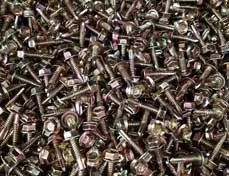stud bolt fully threaded
Understanding Fully Threaded Stud Bolts Essential Fastening Solutions
In the world of mechanical engineering and construction, choosing the right fastening solution is crucial for ensuring the safety, integrity, and longevity of structures and machinery. Among the various fastening options available, fully threaded stud bolts stand out as a versatile and efficient solution for a range of applications. This article will delve into the characteristics, advantages, and uses of fully threaded stud bolts, providing insights that highlight their importance in various industries.
What are Fully Threaded Stud Bolts?
A fully threaded stud bolt is a type of fastener characterized by its fully threaded shaft. Unlike regular bolts, which might have a smooth portion beneath the head, fully threaded stud bolts feature threads that run along the entire length of the shaft. This design allows for enhanced grip and load distribution when paired with nuts or other fastening components. Typically made from high-strength materials such as stainless steel, carbon steel, or alloy steel, these bolts can withstand significant mechanical stress and environmental factors.
Advantages of Fully Threaded Stud Bolts
1. Uniform Load Distribution The continuous threads on a fully threaded stud bolt allow for uniform load distribution across the entire length of the bolt. This feature reduces the risk of uneven wear and potential failure, ensuring that the fastened connection remains secure under varying conditions.
2. Versatility in Application Fully threaded stud bolts can be used in a myriad of applications, including construction, automotive, aerospace, and machinery assembly. Their design makes them suitable for situations where adjustments or tensioning are necessary, such as in structural connections or high-pressure environments.
3. Improved Accessibility and Installation The full thread design simplifies installation and allows for easy adjustments. Users can tighten or loosen the stud bolt easily with a nut, making them ideal for applications where frequent maintenance may be required.
4. Resistance to Vibration Mixing different fasteners can lead to loosening due to vibration. Fully threaded stud bolts, when used with appropriate locking mechanisms, can enhance resistance to loosening that occurs from dynamic loads and vibrations, particularly in high-traffic or operating environments.
stud bolt fully threaded

5. Customization Options Manufacturers often offer fully threaded stud bolts in various lengths, diameters, and materials, allowing engineers and designers to select the best fitting for their specific needs. Custom threaded options can also be produced for specialized applications.
Common Applications
- Construction In the construction industry, fully threaded stud bolts are widely used for securing steel structures, connecting girders, and fastening large prefabricated elements. Their strength and reliability make them ideal for high-load applications.
- Automotive Fully threaded stud bolts are commonly used in engine assemblies, wheel attachments, and suspension systems. Their ability to endure high stress and exposure to challenging conditions makes them indispensable in automotive engineering.
- Aerospace The aerospace industry requires fastening solutions that can handle extreme conditions and stresses. Fully threaded stud bolts provide the necessary strength-to-weight ratio that is critical in aircraft design.
- Industrial Machinery In industrial settings, fully threaded stud bolts are employed in conveyor systems, heavy machinery, and assembly lines, where they secure components that undergo significant wear and tear.
Conclusion
Fully threaded stud bolts are a fundamental component in numerous industries, providing reliability and strength in fastening solutions. Their unique design allows for versatile applications, improving load distribution and simplifying installation processes. As engineering and construction continue to evolve, the demand for effective fastening solutions like fully threaded stud bolts will undoubtedly remain strong, reinforcing their critical role in achieving safety and durability in various applications. Understanding their features and benefits is essential for anyone involved in choosing the right fasteners for their projects.
-
Weatherproof Plastic Expansion Anchors for OutdoorNewsJun.06,2025
-
Sustainability in the Supply Chain: Eco-Friendly TEK Screws ProductionNewsJun.06,2025
-
Load-Bearing Capacity of External Insulation FixingsNewsJun.06,2025
-
Double Head Bolts: Enhancing Efficiency in Industrial MachineryNewsJun.06,2025
-
Corrosion Resistance in Chipboard Screws: Coatings for Wholesale DurabilityNewsJun.06,2025
-
Butterfly Toggle Bolts : Enhancing Structural ResilienceNewsJun.06,2025
